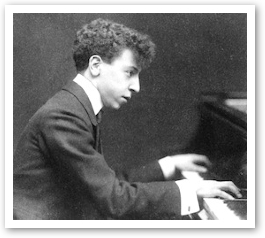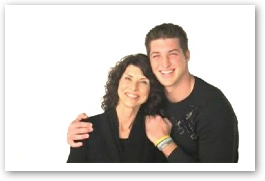The Fragile Dew-Drop
- DONALD DEMARCO
A pianist, an actress, and an athlete, all pre-eminent in their respective fields, survived the threat of abortion and brought to the world stage superlative images of beauty, grace, and strength.
 |
Arthur Rubinstein
1887-1982 |
We live, scientists tell us, in a four-dimensional space-time continuum. In a way that is difficult to grasp, space and time are profoundly inter-related. But the imagination lives in a fifth dimension – Dimension H – the realm of the hypothetical. What is and what could be lie in tantalizingly close proximity to each other, separated only by our free choices. Free choice is the dramatic switch that separates what will be from what could be. Nothing is more important in life than choosing rightly.
These thoughts came to mind recently while I watched one of my very favorite movies, Carnegie Hall (1947). I was in awe as I observed and listened to that pianistic titan, Arthur Rubinstein, as he performed Chopin's heroic A-flat Polonaise and Manuel de Falla's demonic Ritual Fire Dance. Strength and subtlety, power and passion! Rubinstein always appeared to me as indomitable. Yet, the imagination knows otherwise. Dimension H led to a radically different outcome.
I picked up his autobiography – Arthur Rubinstein: My Young Years (Knopf, 1973) – and re-read its opening words: "My life was saved by my Aunt Salomea. A seventh child eight years after the last-born, I was utterly unwanted by my parents, and if hadn't been for the enthusiastic persuasion of aunt Salomea Meyer, my intrusion into this valley of suffering might have been prevented."
Rubinstein's life could have been snuffed out as easily as I could have turned off the TV. "I rang the bell at the gate of life," the great pianist tells us, "as a belated and rather unwanted guest".
Life, as the poet John Keats describes it, is "A fragile dew-drop on its perilous way from a tree's summit" (Sleep and Poetry). Life begins in the embrace of love, truly a lofty beginning. But then, the perilous journey in the care of capricious choice. Or, in the case of the adult Rubinstein, the supporting power of a belt from a worn-out robe.
Rubinstein was penniless, hungry, and depressed. His career was not unfolding as he had hoped. Suicide beckoned to him. But the belt he used to hang himself tore apart, and the man who was destined to become the 20th Century's most romantic concert pianist, fell to the floor with a crash. Half-conscious, he dragged himself to his piano and cried himself out in music. Then, out of a chaos of thought, came a blazing revelation. At that moment, he tells us, he "discovered the secret of happiness," one that he continued to cherish throughout his life: "Love life for better or for worse, without conditions" (p. 255).
 |
Loretta Young
1913-2000 |
Being a traveler along the paths of Dimension H, I then imagined changing the channel, once Carnegie Hall had concluded, to watch The Farmer's Daughter (also 1947). This is the motion picture that won an Academy Award for its star, Loretta Young. But there was no such movie because Loretta Young never existed.
Miss Young's mother, at age 23, was raising her two daughters. When she became pregnant with her third child, her younger daughter was just nine months old. Both her husband, for financial reasons, and her doctor, for medical reasons, advised her to undergo an abortion. It seemed to be the sensible thing to do. After much confusion and an ocean of tears, she sought the assistance of Father Ildefonsa, the priest who had instructed her in her faith. She decided to have the baby and named her eight-pound girl, Loretta. The young mother's health improved and, well into her eighties, was recognized as one of the foremost interior decorators in California.
Years later, Loretta, now married and 2½ months pregnant with her second child, found herself in a situation similar to the one her mother had experienced. Her Hollywood studio strongly advised her to abort or forfeit a prospective $4.5 million contract. When she refused to comply, the studio criticized her for being more interested in having a family than having a career in motion pictures.
Loretta had her baby and lost her contract. But the following year she won an Oscar for her role in The Farmer's Daughter. Her former studio, realizing that she had become a great box office attraction, then offered her an even more lucrative contract. Her rejection was, as she puts it, one of the most satisfying "No's" of her life.
 |
Tim with this mom, Pam Tebow
|
My imagination returned to the highway of Dimension H. This time, it was January of 2009. I turned the TV channel to ABC to see if super-athlete Tim Tebow could lead his Florida "Gators" to an NCAA championship against the vaunted Oklahoma "Sooners" who, at that time were ranked #1 the nation.
Tebow was a legend even as a high school athlete. He was listed among the top 33 high school football players in the state of Florida's 100 year history. His high school stats were truly mind-boggling: 9,810 passing yards, 3,186 rushing yards, 95 touchdowns passing, and 62 touchdowns rushing. One of the highlights of his high school career was finishing a game on a broken leg.
In college, as an All-American quarterback, he was the first college football player to rush and pass for 20 or more touchdowns in a single season. He became the first sophomore to win the Heisman Trophy, an award emblematic of being the year's most outstanding college football player. Tebow's leadership qualities and his determination to win were unsurpassed. Could he carry the "Gators" to an NCAA championship?
But neither Mr. Tebow nor any of his teammates could be found anywhere on TV. What had happened? Had his fragile dew-drop of life been prematurely extinguished?
Bob and Pam Tebow were Christian missionaries in the Philippines. While pregnant with Tim, Pam contracted amoebic dysentery through contaminated drinking water. Her doctor informed her that the medications she needed to recover would result in irreversible damage to the child she was carrying. He also warned that continuing her pregnancy would endanger her life. Therefore, her doctor advised an abortion.
Tim was born in 1987, robust and healthy. His mother survived the delivery very nicely. Today, Tim Tebow stands six-foot-three and weights 235 pounds. He is an elusive runner, accurate passer, and very difficult to bring down. He has also joined his parents in their missionary activities.
Shifting from the realm of the imagination back to reality, I witnessed, with much pleasure, the Tebow-led "Gators" defeat the Oklahoma "Sooners" 24-14, and lay claim to the National Championship.
Charles Dickens' Christmas Carol and Frank Capra's It's A Wonderful Life are very successful ventures into Dimension H. The former tells of the grim tragedies that would unfold unless the heart Ebenezer Scrooge underwent a thawing. The latter tells of the terrible void that would have been created if George Bailey never lived.
A pianist, an actress, and an athlete, all pre-eminent in their respective fields, survived the threat of abortion and brought to the world stage superlative images of beauty, grace, and strength. The mandate to "choose life" thus becomes more compelling and more eloquent when we consider how much the world would have lost had this trio been prematurely extinguished, as well as the joys of life which they, themselves, would never have experienced.
The superhighway of Dimension H, though purely imaginary, can be of great service in recapturing the limitless potential of life and the sheer emptiness of its opposite. I behoves us, therefore, to choose life.
 This is Meaghen Gonzalez, Editor of CERC. I hope you appreciated this piece. We curate these articles especially for believers like you.
This is Meaghen Gonzalez, Editor of CERC. I hope you appreciated this piece. We curate these articles especially for believers like you.
Please show your appreciation by making a $3 donation. CERC is entirely reader supported.

Acknowledgement
Donald DeMarco. "The Fragile Dew-Drop." excerpted from The Value of Life in a Culture of Death (Kitchener, ON: Mission House Publications, 2010): 20-24.
This article is reprinted with permission from Donald DeMarco.
The Author






